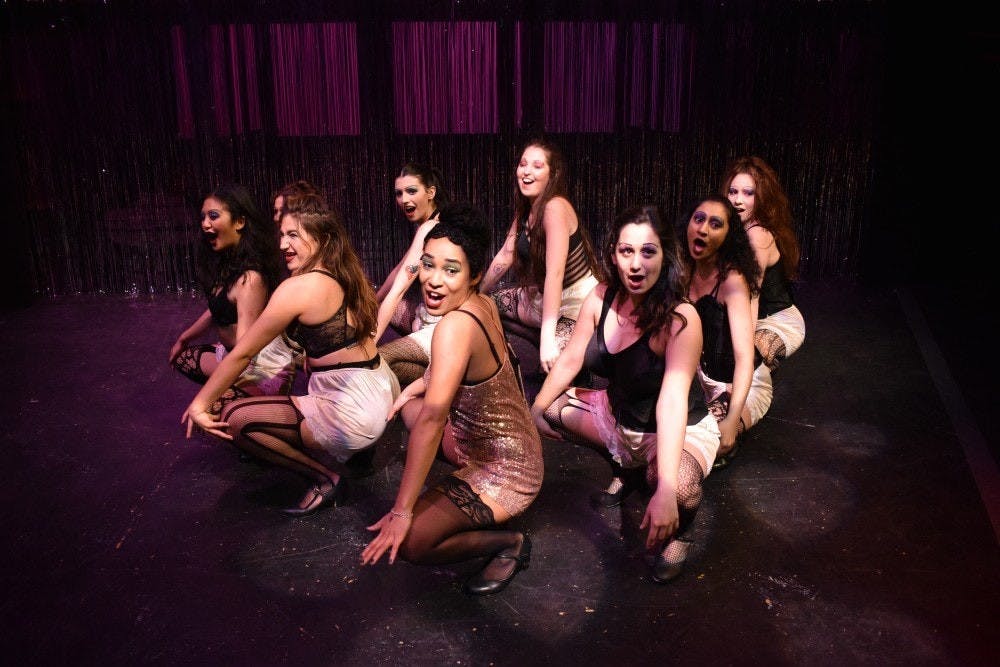Last weekend I saw the Barnstormers’ production of Cabaret. It was the second week of the show’s run, so I had some background on the musical. It takes place in 1930s Berlin. There is a lot of sex. A Nazi is involved. It’s an interesting show, to say the least.
There was a content advisory paper in the playbills for audience members who didn’t know about the musical in advance. “This production contains strobe lights and scenes with sensitive and explicit subject matter.” The warning was sufficient, without giving any of the content away.
Still, I was taken aback when the show got as dark as it did. When Ernst Ludwig exposed his swastika armband toward the end of act one, I was shocked even though I knew that the character was a Nazi.
When act two depicted Berlin declining into Nazism, I was disappointed even though I know the history. And when the musical concluded with all of the Cabaret dancers — and the one Jewish character — ending up in what I assumed to be a concentration camp, I was frozen.
The Barnstormers did a great job of capturing the emotion of a city on the brink of political collapse. But I wasn’t sure what I was supposed to feel.
At the Jewish day school that I attended until coming to Hopkins, we learned about the Holocaust at least once a year on Holocaust Remembrance Day. As I got older we began learning about the subject more often. Survivors would come in to speak about their experiences during school-wide assemblies. In senior year I took a history class where we spent over a month on the Holocaust, and we went on an optional trip to visit the sites in Poland.
I will never be desensitized to the Holocaust. The idea that such terrible atrocities could take place just 70 years ago still makes me sick. The pictures, videos, testimonials and speakers ensured that I would remember the details that were shared.
I valued the information that I was taught. But when it came to entertainment, I typically chose not to engage. Movies such as Schindler’s List or novels like The Book Thief interested me for their value as great stories.
But the background that they come with — the setting that makes the stories so powerful — always turned me away. The Holocaust felt real enough to me with the real accounts I heard and saw. I didn’t want it to seep into my escapist fictional world.
Since arriving at college, though, I am now able to see the value of portraying the Holocaust in popular culture. We need these portrayals, fictional and nonfictional. People are forgetting that the Holocaust ever happened. According to a study done by Schoen Consulting in 2018, 49 percent of millennials cannot name a single ghetto or concentration camp, of which there were over 40,000.
Yet hate crimes are rising in the U.S. As of 2017, the last year that the Federal Bureau of Investigation (FBI) released hate crime data, there has been a continuous increase of hate crimes over the last three years.
The public is misremembering what happened in Europe after years of increasing violence, and a toxic political divide is not helping matters.
If watching The Boy in the Striped Pajamas or seeing a production of The Diary of Anne Frank is what it takes to remind people that the Holocaust took place, then it is extremely important that these interpretations exist. There is a difference between moving on and forgetting entirely, and we are in danger of forgetting entirely. And I’ve found that I too am becoming forgetful.
I’ve heard survivor accounts. I’ve even visited four death camps in Poland, one of the scariest and most emotionally draining experiences of my life.
And yet I forgot on the two days a year I’m supposed to remember. International Holocaust Remembrance Day takes place on Jan. 27. The Israeli memorial day, Holocaust Remembrance Day, is April 12, just last week. It slipped my mind, except for a few brief moments during the day.
The Holocaust must be remembered. People want to remember: The Schoen Consulting study found that 80 percent of respondents think it is important to teach about the Holocaust to prevent it from recurring.
At the same time, we must remember that while we portray or talk about the Holocaust, we need to do so with caution. It should not be mocked or romanticized.
Casual Holocaust jokes are unacceptable. Outfits that resemble concentration camp style clothing are also tasteless. Making light of the events does nothing but distance everyone from a time that is already growing farther away.
This is not to say that Cabaret tried to romanticize or make fun of the Holocaust, though it made me uncomfortable. I did not enjoy that the musical ends with a scene at a concentration camp. I wonder if the original script of the play could have been reworked so as to imply the finality more subtly.
However, in this case, I am glad that the discomfort was there. It was earned at the end of the show. We need to be reminded.
Ariella Shua is a sophomore from Livingston, N.J. majoring in Writing Seminars. She is the Your Weekend Editor.





